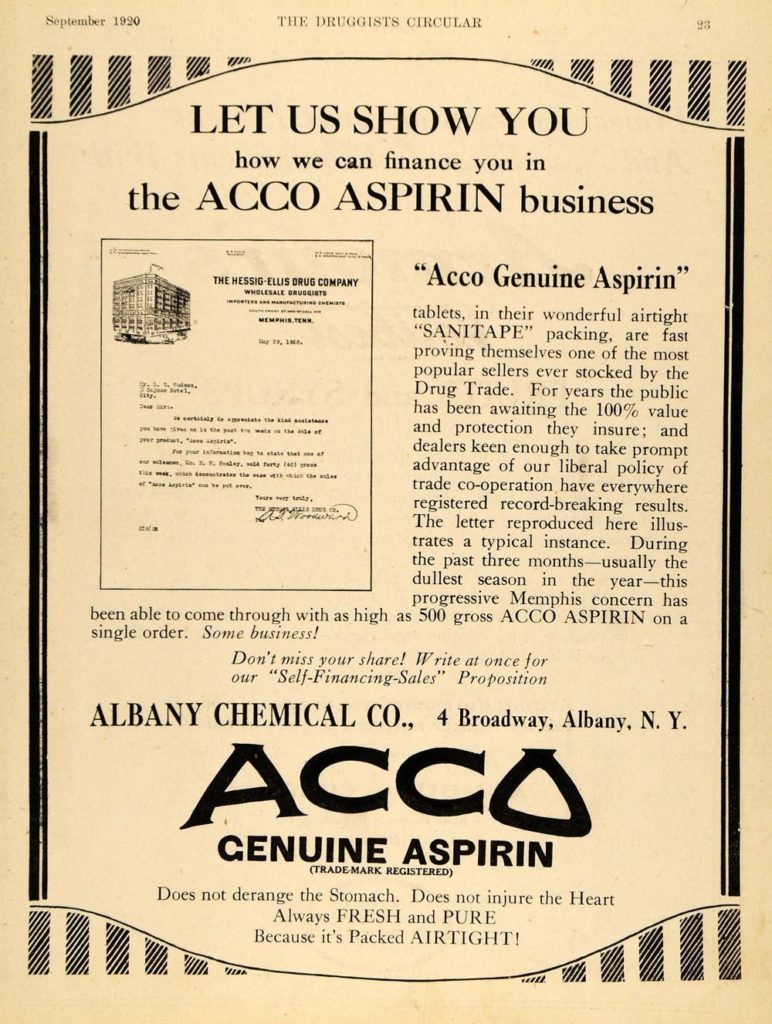
So we mentioned that during the Albany Chemical Company’s reign as the top producer of chloroform in the country, they were embroiled in some patent battles. Well, some decades later, they were to be found in patent court once again, this time trying to enforce a patent they didn’t really hold. They were pioneering patent trolls.
By 1920, the Albany Chemical Co. was selling “Acco Genuine Aspirin.” In their advertising, they warned that “‘ASPIRIN’ is the registered trade-mark property of the Albany Chemical Company. The Albany Chemical Company are manufacturers of ‘GENUINE (Trade-mark Registered) ASPIRIN’ Tablets. Any statement to the contrary made by any other manufacturer is a misrepresentation of truth.” Did that sound like they were protesting just a bit much? That’s because they were.
Anyone with a passing familiarity with trademark law knows of aspirin as perhaps the most famous case of a brand name losing its trademark protection (“heroin” being another). Aspirin was created by The Bayer Company in Germany, which sought patent and trademark protection wherever it was available in order to differentiate and protect their product from (somewhat ironically named) patent medicines. They brought their product to the United States and began manufacture of aspirin in scenic Rensselaer in 1903. Then there was that pesky war (the first one), and many German-owned assets were seized and sold by the government of the United States, the Bayer Company holdings among them. The Rensselaer plant and Bayer’s patents and trademarks were auctioned off, and aspirin landed in the hands of, naturally, a patent medicine company called Sterling Products. (Bayer didn’t get their own name and trademarks back until 1994, paying a reported $1 billion for the privilege.)
The patent on aspirin expired in 1917. In that same year, under challenge that the term had become generic (and possibly with a tiny bit of anti-German sentiment), the trademark was cancelled. “Aspirin” became a generic term, and hundreds of brands of aspirin suddenly appeared on the market.
In stepped the Albany Chemical Company, which in 1920 began petitioning various states for registration of the word “aspirin,” following which it plastered ads all over the place claiming aspirin was its trademark and that it was the only company from which it was safe to purchase the painkiller. In addition to their advertising, they peppered their competitors with cease and desist letters.
The Federal Trade Commission issued this neat little summary of the docket on April 19, 1921:
Where a corporation engaged in the manufacture and sale of drugs, including acetyl salicylic acid, popularly known as “aspirin,” registered the word as a general trade-mark in a large number of States, accompanying its applications for registration with affidavits that it alone had the right to use the word, and thereafter –
(a) Advertised generally that “Acco Aspirin,” its product, was the only genuine aspirin;
(b) Advertised that the word was its general trade-mark; and
(c) Threatened numerous druggists and dealers with suits for infringement if they used the word on the products of any other concern;
Notwithstanding the fact that long prior to such attempted appropriation thereof, the word had been continuously, openly, and notoriously applied by numerous other manufacturers and dealers to the product acetyl salicylic acid and the exclusive right there to openly asserted and pressed by the successor to another company, the original patentee of the product and registrant of the word.
Readers will be shocked to learn the FTC didn’t find in Albany Chemical Company’s favor.

Leave a Reply